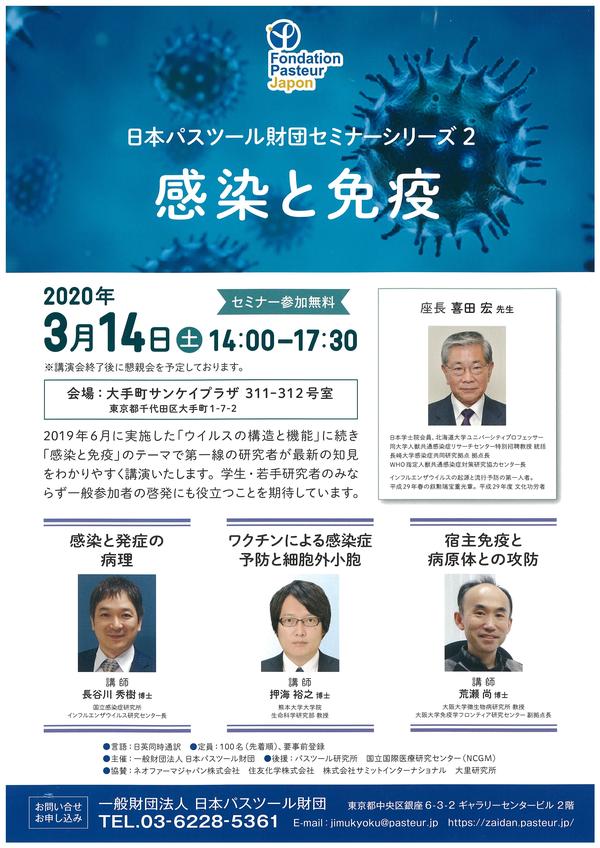News&Topics
Information
2020/12/24Information
Seminar Series 2 "Infection and Immunity" hosted by Foundation Pasteur Japan
Foundation Pasteur Japan (FPJ) held a seminar "Infection and Immunity" as seminar series 2 on December 5th, which Osato Research Institute supported as one of the sponsors. As with the first seminar series in June last year, it was chaired by Prof. Hiroshi Kida, University Professor of Hokkaido University. Originally, it had been planned to be held on March 14th, but it was postponed due to the expansion of the new coronavirus infection. This time, it was made possible by limiting the number of direct participants at the venue, and more than 70 people participated online.
+‥‥‥‥‥‥‥‥‥‥‥‥‥‥‥‥‥‥‥‥‥‥‥‥‥‥‥‥‥‥‥‥‥‥+
As the first lecturer, Dr. Hideki Hasegawa, Director of the Influenza Virus Research Center, National Institute of Infectious Diseases, made a presentation on the theme of "Pathological analysis of severe influenza and corona virus infections".
There is a big difference between severe influenza and COVID-19 infections. One of the most common complications of influenza is bacterial pneumonia, which can lead to encephalopathy and myocardial damage. There are seldom cases of viral pneumonia like bird flu.
On the other hand, one of the serious complications of COVID-19 is viral pneumonia, an infection of your lungs caused by a virus. It can be combined with bacterial pneumonia or thrombosis, which can lead to death. According to Dr. Hasegawa, the viral pneumonia progresses differently depending on which part of the lung is infected.
It spreads in the airway rather than through blood, so it can be said that the respiratory tract is the main part of the damage. In addition, influenza can be spread by all the infected, but the novel coronavirus seems to spread differently. 2 out of every 10 infected people transmits the virus, but the remaining 8 do not infect anybody.
Next, Dr. Hiroyuki Oshiumi, a professor at the Graduate School of Life Sciences, Kumamoto University, made a presentation under the theme of "Innate immune response against SARS-CoV-2 infection and a chemical screening to isolate small molecules exerting anti-SARS-CoV-2 activities " as the second lecturer.
There are two types of immunity: innate and acquired. Innate immunity is the immune system that is present when you are born and acquired immunity is the one developed after first infection and shows resistance to future encounter with that pathogen.
The new coronavirus is a positive-sense single-strand RNA virus. According to Dr. Oshiumi, innate immunity recognizes the two regions on SARS-CoV-2 genomic RNA in human epithelial cells. However, they found that, despite of the ability to recognize it, it cannot functionat the actual scene of infection. The protein of the virus suppresses innate immunity, which disrupts immunity system, leading to more severe symptoms (cytokine storm). Therefore, he began investigating therapeutic agents to control the confused innate immunity. Suchtherapeutic agents targeting the innate immune response can suppress new virus and can be used in cojunction with anti-viral drugs such as Avigan or Remdesivir. Since it is expected to induce memory of innate immunity, it might be used as a preventive drug. Likewise, BCG vaccination is said to have a potential to mitigate COVID-19 severity by inducing innate immunity, but there is no way to be sure at the moment.
The third lecturer, Dr. Hisashi Arase of Research Institute for Microbial Diseases, Osaka University, made a presentation on "Host-pathogen interaction via paired receptors - Possible mechanism of severe malaria and COVID-19"
Malaria is an infectious disease caused by Plasmodium parasite, which kills 400,000 people annually. It is considered to be one of the most important infectious diseases in the world that can be infected repeatedly even after the first exposure.
The new coronavirus infects cells by binding spike proteins on the viral surface to human ACE2 receptor, which is expressed in the small intestine or kidney. Furthermore, it has been newly found that L-SIGN and DC-SIGN also act as receptors.
Neutralizing antibodies are antibodies can prevent viral infections. However, even if a novel antibody to neutralize the new coronavirus is produced, it would not work in presence of an enhancing antibody. If the neutralizing antibody is highly effective, it would work well even in presence of strong enhancing antibodies. But if not, it would depend on the level of enhancing antibody of each individual. Dr. Arasesuspects that the presence of enhancing antibodies may be a factor determining the severity of COVID-19.
Furthermore, the antibodies against spike protein from SARS-CoV-2 have been considered to be good to have neutralization capacity, but it has been found it is not always like that. It has become clear that the enhancing antibody may be produced before the neutralizing antibody in some patients, and there are some antibodies that enhance infections by enhancing the binding to ACE2. From the above, he stated that it may be safer to modify the spike protein for Covid-19 vaccines so as not to induce enhancing antibodies.
The three front-line doctors provided the participants with basic information about the new coronavirus and vaccines, as well as new findings that radically alter conventional ideas. The lectures were very easy to understand from the beginning to the end, thanks to the use of charts and demonstrations as well as active question and answer sessions. It was a precious opportunity to learn the current situation of Covid-19 even for non-professional audience.
Reported by Aki Hayashi

